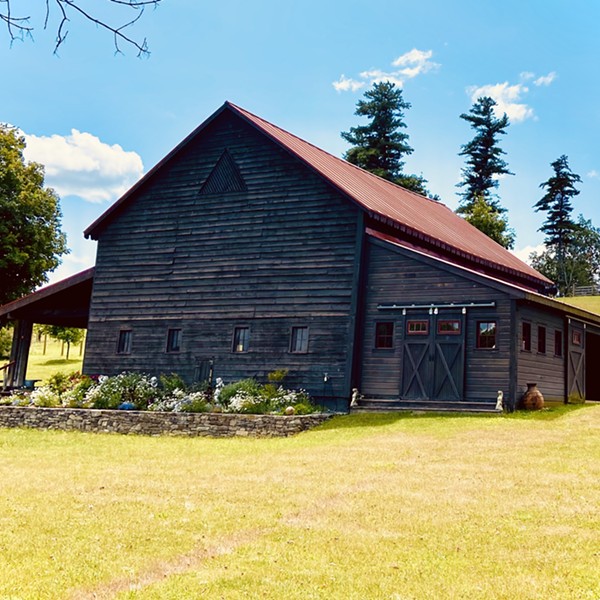Everyone knows how a fairy tale ends. In bedtime stories and countless Disney movies, an evil enchantment is finally broken and the heroine, plucky or otherwise, marries her prince and lives happily ever after. In life, we've been taught to expect the same course of events, perhaps with a Dolce & Gabbana gown and a nice little spread in the New York Times Vows column.
Meet Robin Palmer.
With her dark hair, upturned eyes and lithe grace, Palmer has a princessy glow, and her converted barn outside Germantown is plenty palatial. But like the heroines of her revisionist fairy tales (Cindy Ella, Geek Charming, Little Miss Red, and the upcoming Wicked Jealous), Palmer has done it her own way. Which has nothing to do with waiting for some overbred royal to come to the rescue, and a great deal to do with John Burroughs' maxim "Leap, and the net will appear."
Palmer's self-dubbed "pink barn" is the warm beige of Bermuda sand. From the road, it looks austere, but inside is a breathtaking loft space with skylights, tall windows, and huge hand-hewn beams. When a realtor showed it to Palmer last year, it was love at first sight.
One of her first additions was a magisterial plank table built by a neighbor. On one end sits a saffron-cardamom date cake the author just baked, flanked by fresh tulips and silver candelabra. It looks just a bit like a magazine spread, except for two large jars of Gold's horseradish and gefilte fish on a shelf. No art director would put those there; this is a genuine home, quirks and all.
Palmer settles onto a couch, flashing the near-constant smile of someone who still can't believe her good fortune. She's dreamed of becoming a writer since her second-grade teacher read one of her stories out loud. "I was totally mortified, and then so pleased," she recalls. But the journey toward getting her wish wound through some dark woods.
She was six years old when her mother took her own life. "When you lose a parent really young—I felt so different from everyone, especially losing a parent the way I did. I didn't understand it. Nobody did," Palmer says. She remembers her father taking her to Disneyland, where she was photographed with Snow White. "My dad had just been widowed, and I desperately wanted him to marry Snow White." Happily ever after, again.
Three years later, her father did marry again, giving her a new stepmother and two older, more confident stepsisters. "The blueprint was Cinderella," says Palmer, who borrowed that blended-family dynamic for her middle-grade series Yours Truly, Lucy B. Parker, in which Lucy's single mother starts dating the dad of a Hannah Montana-like teen superstar.
Palmer's family moved several times during her teen years, from New Jersey to Massachusetts and back. She studied communications at Boston University, and went to Hollywood as soon as she graduated, renting an apartment in what turned out to be a drug mecca. "There were LAPD helicopters going overhead—I was terrified to leave my apartment. I thought, 'What have I done?' I had no job, I didn't know anyone—all my friends had moved to New York."
Within a few months, she'd found safer digs and an assistant's job at the William Morris Agency. "It was like going to graduate school. It's Ground Zero for the entire industry." Palmer's boss, "the nicest guy in the entire world," helped her move into script development. Eventually she was hired by Lifetime, where she was a network executive for five years.
It was a heady time, with many projects in production and an expense account. But something was missing. Palmer recalls her thirtieth birthday party. "I looked out at 100 of my quote unquote close personal friends, half of whom I didn't know, singing 'Happy Birthday.' All I could think was, 'How did I get here?'" The wish she made as she blew out the candles was, "Help me figure this life thing out."
What helped her untangle the knot was a screenplay she wrote on spec during her last year at Lifetime. Over the next five years, she also completed a memoir (Adventures of a Recovering Drama Queen) and a novel. All received positive feedback; none of them sold. "Meanwhile I was still living in LA, surrounded by the business, but no longer part of it. It was humbling."
The work itself kept her going. "I just knew I was never happier than when I was writing. In the middle of the night—I don't have kids, but I use the metaphor of birth a lot—I was up late writing, and I thought, 'I bet this is what it feels like to get up and nurse your child. This brings me more joy than anything I've ever done, and I will do whatever I have to do to support it.'"

















